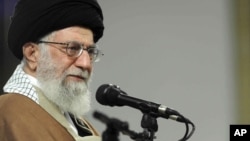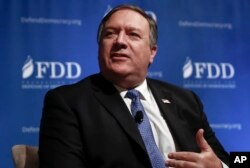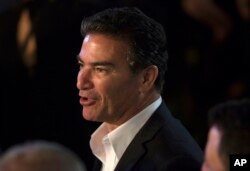Iran’s Supreme Leader Ayatollah Ali Khamenei on Tuesday said the United States would “fail miserably” if it attempted to interfere in Iranian affairs.
Earlier this week, Iran’s foreign minister, Mohammad Javad Zarif, said recent unrest in the country was caused by U.S. “interventionist” strategies, calling them some of the nation’s most serious security challenges.
'We must listen, we must hear'
Zarif also alleged that foreign powers — including regional rival Saudi Arabia — stirred up unrest. In his latest speech, Khamenei repeated a claim trumpeted by some Iranian officials that the recent protests were not only organized but heavily financed from abroad.
Khamenei acknowledged for the first time that people might have real grievances and concerns, saying, “We must listen. We must hear. We must provide answers within our means.” But he continued to blame the unrest mainly on foreign intrigues.
“Once again, the nation tells the U.S., Britain and those who seek to overthrow the Islamic Republic of Iran from abroad that you’ve failed, and you will fail in the future, too,” he stated in a tweet Jan. 9.
The United States has rejected Tehran’s claims that Washington or U.S. intelligence agencies have been behind the protests.
Internal problems
Talking to Fox News, CIA Director Mike Pompeo said it is Iran’s internal problems and not the U.S. that triggered the protests.
“The economic conditions in Iran are not good.That’s what caused people to take to the streets,” Pompeo said.
President Donald Trump has praised what he called the courage of the Iranian demonstrators.
'Eyes, and ears' in Iran
Yossi Cohen, who heads Israel’s intelligence agency, Mossad, told a finance ministry convention in Jerusalem Tuesday that the current protests in Iran were unlikely to topple the regime without reacting to Khamenei’s allegations. “We have eyes and ears and more, even in Iran,” he added.
In his speech, Khamenei implied that Riyadh had a role in the protests, referring to money that came from a “dirty rich country near the Persian Gulf.” Riyadh has not yet reacted to the claims.
However, an escalating war of proxies has resulted lately in some diplomatic encounters between the diplomats of the two countries.
After months of harsh tweet exchanges between Zarif and his Saudi counterpart, Adel al-Jubeir, some media outlets reported tension between the two during the Mediterranean Dialogues summit in Rome in December 2017.
The top Saudi diplomat was quoted as blasting what he called Iran’s “negative influence throughout the region.”
Riyadh cut off diplomatic ties with Tehran in January 2016 following angry protests in front of its diplomatic premises in Tehran.







